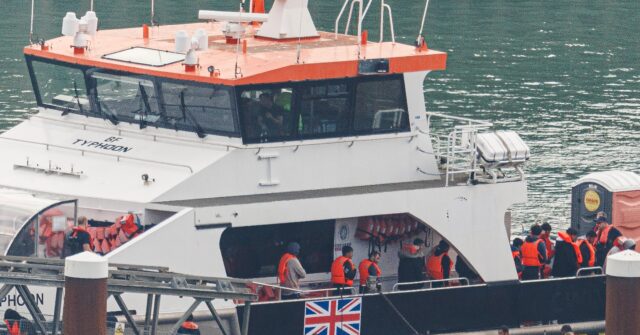The English Channel has seen a record number of illegal crossings, with nearly a thousand migrants reaching British soil in a single day. On Saturday, 973 migrants were brought ashore after setting sail from France in 17 small boats operated by people smugglers. This new high surpassed the previous record for the year, which occurred on June 18 when 882 migrants arrived in 15 boats. This wave of illegal crossings comes amid increasing tensions over the handling of migration issues between the UK and France, highlighting the ongoing challenges that both countries face in managing their borders.
The total number of illegal crossings for the year now stands at 26,612, reflecting a significant increase from 2022, which saw only 25,330 crossings at this time last year. However, the number of arrivals is still lower than the peak recorded in 2022 when 33,611 migrants traversed the Channel up to this point in the year. The recent uptick in crossings underscores the persistent issue of illegal migration across the Channel and raises concerns about the safety of those attempting the perilous journey. Tragically, the situation has been compounded by the deaths of four individuals, including a two-year-old boy who was reportedly trampled to death by other migrants onboard a crowded boat.
In response to this escalating crisis, the UK government is increasing its investment in border security measures. Home Secretary Yvette Cooper announced an immediate allocation of £75 million intended to bolster security and enhance the National Crime Agency’s investigations into people smuggling networks. This funding aims to address the ongoing challenges posed by human traffickers exploiting vulnerable individuals eager to reach the UK. The situation remains dire as governments grapple with providing support to those arriving while also attempting to curb illegal crossings.
At the international level, the G7 countries have agreed to enhance cooperation to confront human smugglers, committing to joint investigations and improved intelligence-sharing to track migrant routes. The G7 plan also emphasizes collaboration with social media companies to tackle the online content that promotes smuggling services, recognizing that modern communication platforms play a significant role in facilitating illegal migration. This multi-faceted approach reflects a growing recognition among nations that coordinated efforts are essential in tackling the complexities of migration.
Despite the significant influx of migrants crossing the Channel, the UK government, led by the Labour Party, has refrained from implementing measures akin to Australia’s successful Operation Sovereign Borders. This avoidance of a strict turn-back-the-boats policy raises concerns among various political figures, including Reform UK MP Rupert Lowe. Lowe expressed deep frustration over the continued entry of “thousands of unknown foreign young men illegally” into the UK and questioned the justification for their care and housing at taxpayer expense. Such sentiments highlight broader public anxieties about illegal immigration and its implications for national security and public services.
In conclusion, the English Channel’s rising number of illegal crossings has become a pressing issue for the UK and France, underscoring the dire need for effective strategies to address human smuggling and the safety of vulnerable migrants. While both countries are implementing increased security measures and international cooperation frameworks, the ongoing debate over the ethical and logistical approaches to managing immigration continues to challenge policymakers. As the situation evolves, greater attention will be required to not only safeguard national borders but also to respond compassionately to those seeking refuge in the face of danger.

